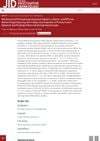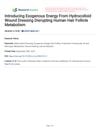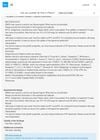
A woman regrew her hair after receiving injections of special cell-derived vesicles.
 January 2023 in “Frontiers in bioscience”
January 2023 in “Frontiers in bioscience” Artemis protein may help control hair growth and health by influencing cell processes.
 January 2023 in “Advances in pharmacology and clinical trials”
January 2023 in “Advances in pharmacology and clinical trials” Human hair is a significant sample for various tests in clinical, nutritional, archaeological, and forensic studies.
 January 2023 in “Biocell”
January 2023 in “Biocell” Safflower extract helps protect hair follicle cells from damage caused by chemotherapy.
 December 2022 in “Korean journal of medicinal crop science/Han-gug yagyong jagmul hag-hoeji”
December 2022 in “Korean journal of medicinal crop science/Han-gug yagyong jagmul hag-hoeji” Natural extracts like ginseng, green tea, shiitake, and aloe vera may help prevent hair loss by protecting hair-related cells.
 December 2022 in “Journal of applied biological chemistry”
December 2022 in “Journal of applied biological chemistry” Betula platyphylla extract, particularly the H3-2 fraction, may help treat hair loss by promoting cell growth and inhibiting a hair loss-related enzyme.
 November 2022 in “The journal of investigative dermatology/Journal of investigative dermatology”
November 2022 in “The journal of investigative dermatology/Journal of investigative dermatology” YAP1 is important for skin regeneration and may affect skin disorder treatments.
 November 2022 in “Journal of Investigative Dermatology”
November 2022 in “Journal of Investigative Dermatology” Apocynin may protect skin cells from aging and damage caused by UVB light.
 November 2022 in “Journal of Investigative Dermatology”
November 2022 in “Journal of Investigative Dermatology” Growth hormone-releasing hormone (GHRH) boosts hair growth and human scalp hair follicles have their own growth hormone system.
 November 2022 in “Journal of Investigative Dermatology”
November 2022 in “Journal of Investigative Dermatology” Butyrate helps hair grow longer, improves hair cell health, increases pigment production, and boosts hair's natural defenses.
 November 2022 in “Journal of Investigative Dermatology”
November 2022 in “Journal of Investigative Dermatology” DermaCult™ Keratinocyte Expansion Medium allows human skin cells to grow longer while keeping their ability to develop properly.
November 2022 in “Journal of Investigative Dermatology” Cell-based therapy using specific immune cells may help treat alopecia areata by promoting hair regrowth.
 October 2022 in “Benha Journal of Applied Sciences”
October 2022 in “Benha Journal of Applied Sciences” Human Beta Defensin 1 levels do not predict the risk or severity of Alopecia Areata.
 September 2022 in “Research Square (Research Square)”
September 2022 in “Research Square (Research Square)” Hydrocolloid wound dressings emit energy that can affect human hair follicle metabolism.

Coconut oil helps protect and improve damaged hair.
 July 2022 in “The journal of investigative dermatology/Journal of investigative dermatology”
July 2022 in “The journal of investigative dermatology/Journal of investigative dermatology” Particulate matter causes inflammation in hair cells, potentially harming hair growth.

Melatonin may improve hair growth by affecting certain cell signaling pathways.

Melatonin may help hair growth by affecting certain cell signals, and the paper improved after revisions.

Melatonin improves hair growth-related cell properties by activating a certain cell signaling pathway.
March 2022 in “Book Publisher International (a part of SCIENCEDOMAIN International)” Human hair has bipolar electrical charges due to gaps in the hair follicle's electromagnetic fields.
 January 2022 in “Springer eBooks”
January 2022 in “Springer eBooks” Using micrografts with stem cells and platelet-rich plasma can safely and effectively help regrow hair.
 January 2022 in “Journal of St. Marianna University”
January 2022 in “Journal of St. Marianna University” Substances from human hair cells can affect hair loss-related genes, potentially leading to new treatments for baldness.
 January 2022 in “Food Science and Technology”
January 2022 in “Food Science and Technology” The herbal mixture could potentially improve hair loss.
 January 2022 in “Pharmaceutical Sciences Asia”
January 2022 in “Pharmaceutical Sciences Asia” The extract from Clitoria ternatea flowers helps human skin cells grow and promotes hair growth in mice.
 January 2022 in “Figshare”
January 2022 in “Figshare” Dexamethasone increases androgen receptor activity in scalp cells, which might explain stress-related hair loss.

Human hair keratins can be turned into useful 3D biomedical scaffolds through a freeze-thaw process.
December 2021 in “Journal of natural fibers” The conclusion is that new methods for isolating hair cuticle cells and removing the cuticle layer are effective and convenient.
 November 2021 in “Research Square (Research Square)”
November 2021 in “Research Square (Research Square)” 3D spheroid cultures of human hair follicle cells are better for hair growth research than 2D cultures, and they provide new insights into how hair growth treatments like minoxidil and TCQA work.
 August 2021 in “Journal of Investigative Dermatology”
August 2021 in “Journal of Investigative Dermatology” Stress causes hair loss by making the body produce cortisol, which stops hair cells from growing.
August 2021 in “Journal of the American Academy of Dermatology” The shampoo's ingredients' effect on a hair growth pathway in cells was tested, but the results are not given.

























